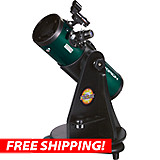Hi Chris,
That’s a great adventure you and your boys can take together. I bought a table-top Dobsonian telescope eight years ago for my boy and we have used it together to see the Moon, Rings of Saturn, Jupiter and its moons and the Orion Nebula. This kind of scope is purely manual and uses a mirror to capture light. You use a red-dot finder to line up your target and focus using a low power lens, then shift to higher power if conditions allow. You would need some sort of solid support, a table or we use a wheely bin. The model I have is an Orion StarBlast 4.5 Astro Reflector. Current cost is 184 pounds. But I soon bought better lenses.
If you go this route, you will need a star-hopping book to learn the night sky, then you can point out the constellations to the boys. ‘Turn Left at Orion’ is good. There’s a free program, Stellarium which will show you the night sky from your location. Stargazers Lounge is a good place for advice.There’s a getting started section. You will want a red torch, or paint a torch with nail varnish so as not to spoil your night vision. You will need a moon filter as the full moon is very bright. I think this is still a good beginner scope, though if you have a dark site then a bigger dob would show more stars and detail. Skywatcher Skyliner 200P is 289 pounds. A pair of binoculars is good for learning the night sky too. At their age holding binoculars is tricky, but an inexpensive 7x30 that wont mind too much being dropped is good.
One thing to say at the outset is that aside from the moon, everything seen in a scope is tiny and your won’t see colours. So this isn’t like the NASA or Hubble images. But it is still exciting. Mars is a challenge. It is red, really small and with this size of scope you will be lucky to see the poles. Magnification doesn’t matter, all stars are simply points of light. But a bigger scope means bigger mirrors and more light capture to see fainter objects. The more you observe the more you will see, so wrap them up warm. If you have a local astronomy club then they will let you use their dark site and you get to look through some expensive gear. (Personally I’ve not explored astro photography) I do have a refractor (bought second-hand - secondhand gear is often good value) but this long traditional telescope with lenses is more difficult to set up, needs a heavy tripod and more awkward to use. Buy your gear from a specialist shop, online is fine.
The route I didn’t take was to buy an all-singing-all dancing computer controlled scope. Celestron and Sky-Watcher are decent makes. But I found it empowering to find my own stars and not struggle with the orientation and set-up, power tanks and mess with computers. And at 16 now he can find stars and planets for himself.
Light pollution is the real limiter to what you can see. For us a walk down the canal with binoculars will show constellations and meteors at the right time. Really dark skies will show you the Milky Way which is amazing. A frost night after the rain will produce a good night sky. Saw the Pleiades last night through binoculars - an amazing view.
I guess it depends if astronomy will become your hobby too, and how much you are prepared to spend. A good computer controlled set up if you put the time in on set-up could show your boys instant stars without having to find them. But the stars will always be points of light and the nebulae will be misty patches, seeing them at all is a thrill. Being with you and learning the night sky and being out in the real dark will be a thrill if our experience is anything to go by.
All the best,
Derek

This is my orion mini Dob.
It is a tube on a swivel with a concave mirror. Hence a reflector.
The other sort works without mirrors and is a refractor (You will need a tripod)
